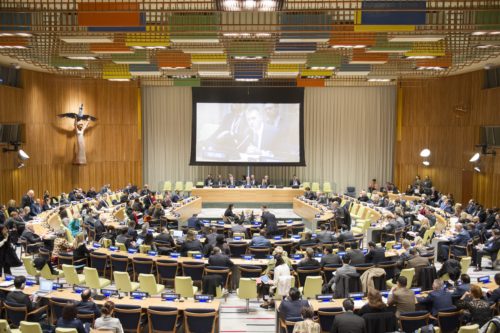
Credit: UN Photo/Rick Bajornas
The United Nations has embarked on the process to elect a new Secretary General to replace Ban Ki-Moon, who will end his 10-year tenure on December 31, 2016. In dramatic contrast to the selection of the current and earlier secretaries general, the public has the opportunity to engage with candidates through a series of open dialogues. Candidates were invited to take part in open hearings before representatives from the 193 Member States and the general public, which began in New York on April 12th, and to participate in a series of public debates. [UN News Centre] In keeping with Article 97 of the UN Charter, the Secretary General is to be elected by the UN General Assembly based on the recommendation of the Security Council. Proponents of an open and inclusive selection process hope open dialogues will help to enhance the UN’s effectiveness and credibility and ensure the election of someone who will strengthen the UN in the face of 21st century challenges such as climate change and the plight of refugees worldwide. [Guardian: New Process] 1 in 7 billion, The Issue.
Selection Process and Timeline
The Secretary General is appointed by the General Assembly, on the recommendation of the Security Council. The Secretary General’s selection is therefore subject to the veto of any of the five permanent members of the Security Council: China, Russia, United States, France, and the United Kingdom. Secretaries general serve five-year terms and, while there is technically no set limit on how many terms one can serve, no Secretary General has served more than two terms. See United Nations, Appointment Process.
In December 2015, the presidents of the General Assembly and the Security Council initiated the selection and appointment process by publishing a joint letter that called for nominees, outlined how the process would include optional ongoing public dialogues for candidates, and stated the Security Council would begin the process of selecting a candidate in July 2016. The dialogues and debates may happen before the beginning of the selection process in July and carry on during the process. The letter provided no specific date by which the next Secretary General will be decided but stated the Council plans to make its recommendation to the General Assembly in a timely manner so as to ensure the newly appointed Secretary General sufficient time to prepare for the job before Ban Ki-Moon leaves the position in December.
The informal dialogues began Tuesday, April 12 in New York with a three-day series of public sessions hosted by the General Assembly. Each of the current nine candidates were given two hours to offer their vision for the future of the UN before taking questions from Member States, civil society organizations, and the general public, who submitted questions on social media via the hashtag #UNSGcandidates. [UN News; Guardian: Public Hustings] Four of the nine candidates also participated in a debate on Wednesday, April 13th hosted by the Guardian newspaper, UNA-UK, New America, and the Future United Nations Development System. Another debate of the same nature is scheduled for June 3rd in London. [Guardian: New Process]
A Break from the Norm
The ongoing informal dialogues mark a significant departure from the UN’s past methods of selecting its Secretary General. For the UN’s first 70 years, the Secretary General was chosen privately by the major powers on the Security Council, and was only then presented to the General Assembly for approval. [Guardian: New Process] The current process is unprecedented in its transparency and opportunity for engagement because it is the first time candidates’ names and visions for the UN have been shared publically and that Member States have been afforded the opportunity to directly engage in open dialogues with candidates prior to their selection by the Security Council. [Guardian: Public Hustings]
The Current Candidates
So far nine potential candidates have been nominated for the Secretary General position, and more are expected to join the competition in the next few months. They include an array of former foreign ministers: Vesna Pusić from Croatia; Srgjan Kerim of Macedonia; Igor Lukšić of Montenegro; Vuk Jeremic of Serbia; Irina Bokova of Bulgaria, who is also Director General of UNESCO; Natalia Gherman of Moldova; and Danilo Türk, a former Slovenian president and assistant UN Secretary General. They are also joined by António Guterres, the former head of the United Nations High Commissioner for Refugees and Helen Clark, the current Administrator of the United Nations Development Program and former New Zealand Prime Minister. [Guardian: New Process] While the Secretary General position has never been held by a woman, four of the current candidates are women. In 2006, there was only one female candidate for Secretary General. [Inter Press Service]
Role of the UN Secretary General
The Secretary General serves as the chief administrative officer of the United Nations. The United Nations Website states, “equal parts diplomat and advocate, civil servant and CEO, the Secretary General is a symbol of United Nations ideals and a spokesperson for the interests of the world’s peoples, in particular the poor and vulnerable among them.” In addition to being the face of the organization, the Secretary General is charged with such tasks as attending sessions of United Nations bodies; consulting with world leaders, government officials, and others; remaining engaged with peoples of the 193 Member States; and staying abreast of the variety of issues on the UN’s agenda. The Secretary General may also raise matters that could implicate peace and security before the Security Council. Additionally, the Secretary General publishes an annual report on the activities and future areas of focus of the United Nations and serves as the chairman of the United Nations System Chief Executives Board for Coordination (CEB), a board that coordinates the UN’s substantive and management matters.
Additional Information
For more information on the UN, visit IJRC’s Online Resource Hub.
